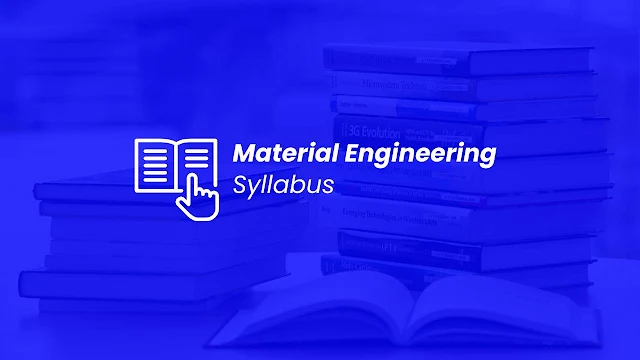Material Engineering Syllabus
Syllabus of Material Engineering Subject:
Materials engineering is a field of engineering that deals with the development, processing, and testing of materials used in various industries. The syllabus for materials engineering typically covers the following topics:
1. Introduction to Materials Engineering:
a. Definition and scope of materials engineering
b. Classification of materials
c. Basic concepts in materials science
d. Properties of materials
e. Manufacturing processes for materials
2. Atomic Structure and Bonding:
a. Atomic structure and elements
b. Chemical bonding and molecular structure
c. Crystal structure and defects
d. Phase diagrams and phase transformations
e. Diffusion and transport phenomena
3. Mechanical Properties of Materials:
a. Stress and strain
b. Elasticity and plasticity
c. Tensile and compression testing
d. Hardness and impact testing
e. Fracture and fatigue
4. Thermal Properties of Materials:
a. Heat capacity and thermal conductivity
b. Thermal expansion and contraction
c. Thermal shock and creep
d. Heat treatment and annealing
e. Thermodynamics and phase transformations
5. Electrical Properties of Materials:
a. Electric charge and current
b. Electric fields and potentials
c. Electric conductivity and resistance
d. Dielectric and magnetic properties
e. Semiconductors and electronic devices
6. Optical Properties of Materials:
a. Electromagnetic radiation and waves
b. Refraction and reflection
c. Absorption and transmission
d. Polarization and scattering
e. Optical materials and devices
7. Materials Characterization Techniques:
a. Microscopy and imaging
b. X-ray diffraction and spectroscopy
c. Thermal analysis and calorimetry
d. Mechanical testing and tribology
e. Surface analysis and spectroscopy
8. Materials Processing and Manufacturing:
a. Powder metallurgy and sintering
b. Casting and solidification
c. Welding and joining
d. Forming and shaping
e. Additive manufacturing and 3D printing
9. Materials Selection and Design:
a. Design criteria and constraints
b. Materials selection methods and databases
c. Materials compatibility and corrosion
d. Material selection for specific applications
e. Sustainable materials and design
10. Materials in Engineering Applications:
a. Materials for structural applications
b. Materials for electronic and optical applications
c. Materials for energy and environmental applications
d. Biomaterials and medical devices
e. Case studies and design projects
11. Nanomaterials and Nanotechnology:
a. Synthesis and characterization of nanomaterials
b. Properties and applications of nanomaterials
c. Nanofabrication and nanotechnology
d. Nanomaterials safety and regulation
12. Composite Materials:
a. Introduction to composite materials
b. Types of composite materials and their properties
c. Manufacturing and processing of composite materials
d. Design and analysis of composite structures
e. Applications of composite materials in various industries
13. Biomimetic Materials:
a. Introduction to biomimetics and bioinspired materials
b. Examples of biomimetic materials and their properties
c. Design and synthesis of biomimetic materials
d. Applications of biomimetic materials in medicine and engineering
14. Advanced Materials:
a. High-performance materials
b. Smart and functional materials
c. Superconductors and magnetic materials
d. Advanced ceramics and glasses
e. Nanocomposites and nanomaterials
15. Materials Science and Engineering Laboratory:
a. Laboratory safety and procedures
b. Materials characterization techniques
c. Mechanical testing and analysis
d. Materials processing and manufacturing
e. Design and testing of materials-based systems
This syllabus provides a comprehensive overview of the topics covered in materials engineering. It is important to note that the actual syllabus may vary depending on the institution and the level of study.







